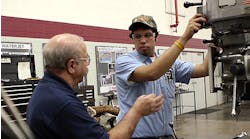During those chaotic early days of 2009, when foundries and diecasters whose businesses depended upon the Big Three automakers were flailing and failing, it occurred to me how the previous decades of good will in the automotive supply chain were being exposed as conditional, or operational.
Having earned a spot in the purchasing book of some big OEM, or having any number of ‘quality supplier’ awards on display, was no security for those metalcasters struggling to make it through after their orders were slashed or canceled. And while two of the Big Three and several large supplier companies were given federal life support, there was nothing to spare for their formerly ‘valued suppliers.’
My thought then was that those branded quality programs in which so many automotive foundries were proud to claim membership had probably not been such friendly arrangements as they were meant to seem. The next time around, I predicted, the lower tiers of the automotive supply chain will be more careful about the promises and assurances they take in their partnerships.
Well, here we are. Automakers are doing well again, and the foundries and diecasters supplying them are doing well too – and this is all good. I have no insight to the current supplier relationships in the automotive industry, but I know that many of the automakers are investing their own capital in metalcasting operations — a primary example is detailed here — and that suggests they have a renewed respect for, or understanding about the industrial segment that concerns me the most. Beyond that, I will simply note that the flags and plaques displayed with pride represent past achievements – not current arrangements.
And this ineluctably calls into discussion their future arrangements, and in fact the future arrangement of manufacturing organizations.
The counterpoint to an extended supply chain of industrial plants is the vision of singular operations, operating with a bare staff and small footprint, producing to order, stocking only a few resources and lots of data files, with a wireless connection as its link to both suppliers and customers. Additive manufacturing is almost always a point in such idealized descriptions — and a few visions of that technology, present and future are laid out in these pages too.
Who will work in such a plant? The tech guy who knows how to reset a network connection? The polymath inventor who divines an application that consumers didn’t know they were missing, and must have now. Will there be a role for the engineer who can analyze gas flow simulations in a casting trial? Will there be a need for metallurgists to refine alloy compositions, or machinists who can write code for a finish grinding process?
Those are the people that manufacturers need now, and it’s hard to imagine them gaining any place in a supply chain without such skills and insights built into their organizations. It’s harder to imagine they will hold those positions as time moves forward.
Lately we’ve learned something else about the past, something that reminds me of the hollow goodwill that exists among commercial bodies. General Motors’ sustained deception about the risk to drivers’ safety as a result of poorly designed ignition switches, followed by the cruel effort to replace those devices without admitting error, stretches from 2002 up to nearly the present. The recall of 2.6 million vehicles is progress, and that will be just the beginning of what the automaker will be made to pay on this breach of trust.
We can have no illusions about the failures and deceptions we have engaged in the past – regardless of the intent, with no reservations about our responsibilities to customers, suppliers, colleagues, and dependents. If we are going to live and prosper in an idealized world, one that is stripped of excess and focused on performance, it will not be just organizations that matter. We are going to have to be better people.









